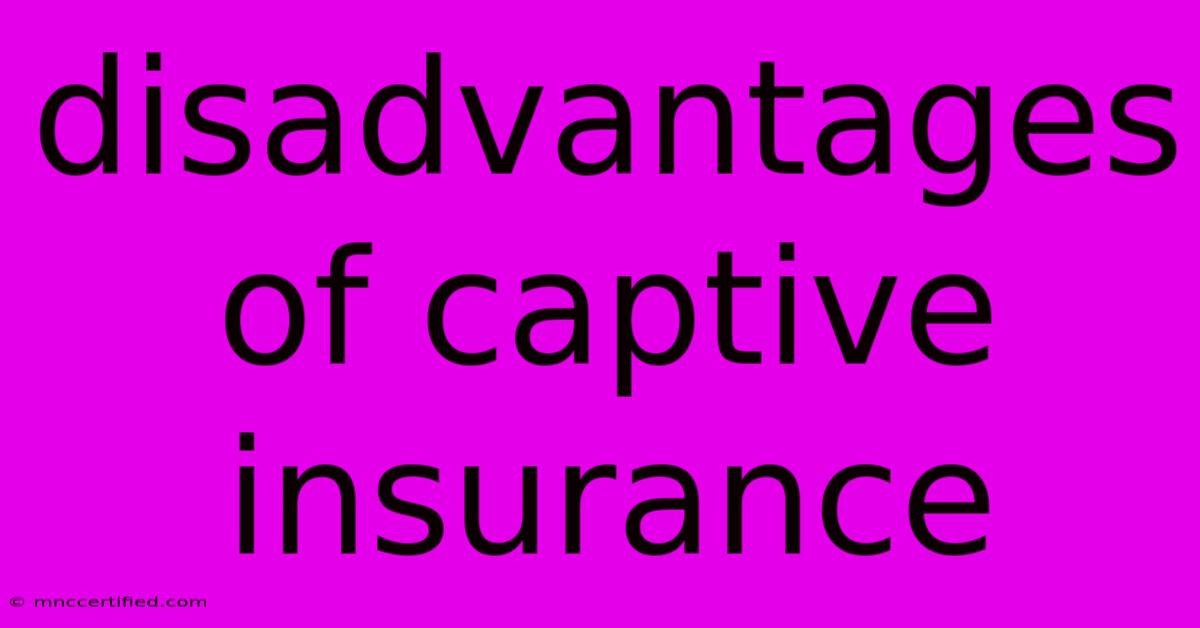Disadvantages Of Captive Insurance

Table of Contents
Disadvantages of Captive Insurance: A Comprehensive Guide
Captive insurance companies, while offering potential tax advantages and risk management control, aren't a one-size-fits-all solution. Understanding the disadvantages is crucial before establishing one. This comprehensive guide explores the key drawbacks you should carefully consider.
High Initial Setup Costs
Establishing a captive insurer demands significant upfront investment. Legal fees, licensing costs, actuarial studies, and the ongoing operational expenses can be substantial, especially for smaller businesses. These high initial setup costs can outweigh the benefits for companies with limited resources. The return on investment (ROI) needs careful evaluation, and you must factor in the long-term commitment required.
Regulatory Compliance and Ongoing Oversight
Captive insurance operates under a complex regulatory framework. Maintaining compliance necessitates adherence to stringent reporting requirements, audits, and ongoing oversight by insurance regulators. Navigating these regulatory hurdles can be time-consuming and expensive, demanding specialized expertise and potentially leading to significant penalties for non-compliance. This adds another layer of complexity beyond the standard business operations.
Potential for Tax Audits and Scrutiny
While tax advantages are a major draw, captive insurance arrangements are frequently subject to scrutiny by tax authorities. The IRS and other tax agencies are increasingly focused on identifying potential tax avoidance schemes. This can result in lengthy and costly audits, potentially leading to penalties and back taxes if the captive isn't structured and operated correctly. Professional tax advice is essential to mitigate this risk.
Limited Access to Reinsurance
Securing reinsurance for a captive insurer can be challenging. Reinsurers may be hesitant to work with newer or smaller captives, limiting the amount of risk transfer available. This restricted access to reinsurance can hinder the captive's ability to manage large or catastrophic losses effectively, negating some of its core benefits. Careful consideration of the reinsurance market is vital during the planning phase.
Potential for Conflicts of Interest
Captive insurance companies are often closely tied to the parent company. This proximity can create potential conflicts of interest, especially regarding claims processing and risk assessment. Ensuring fair and objective handling of claims is critical to maintaining the captive's credibility and avoiding disputes. Implementing robust governance structures and independent oversight can help mitigate this risk.
Lack of Liquidity
Accessing funds from a captive insurer may not be as immediate as with traditional insurance. The claims process, even if internally managed, might involve some delays. This lack of liquidity can be detrimental during urgent financial situations. Businesses should account for this potential delay when planning their risk management strategy.
Management Expertise Required
Effective captive management requires specialized expertise in insurance, accounting, and legal matters. Hiring and retaining qualified personnel can be expensive, adding to the overall cost of operation. The need for specialized expertise underscores the complexity and demands of this alternative risk-financing method. Businesses lacking internal expertise should budget for external consultants.
Conclusion: Weighing the Pros and Cons
Captive insurance offers significant potential advantages, but the disadvantages outlined above cannot be ignored. A thorough cost-benefit analysis, factoring in the complexity and potential risks, is essential before embarking on this path. Consulting with experienced captive insurance specialists, legal counsel, and tax advisors is crucial to ensure a successful and compliant operation. Careful planning and ongoing vigilance are key to maximizing the benefits and minimizing the drawbacks.

Thank you for visiting our website wich cover about Disadvantages Of Captive Insurance. We hope the information provided has been useful to you. Feel free to contact us if you have any questions or need further assistance. See you next time and dont miss to bookmark.
Featured Posts
-
United Underwriters Insurance Utah
Nov 16, 2024
-
Motorcycle Stolen Insurance Payout
Nov 16, 2024
-
Watch Scotland Croatia Game Free
Nov 16, 2024
-
New Cobra Kai Season 6 Episode Release
Nov 16, 2024
-
Insurance And Risk Management Fbla
Nov 16, 2024